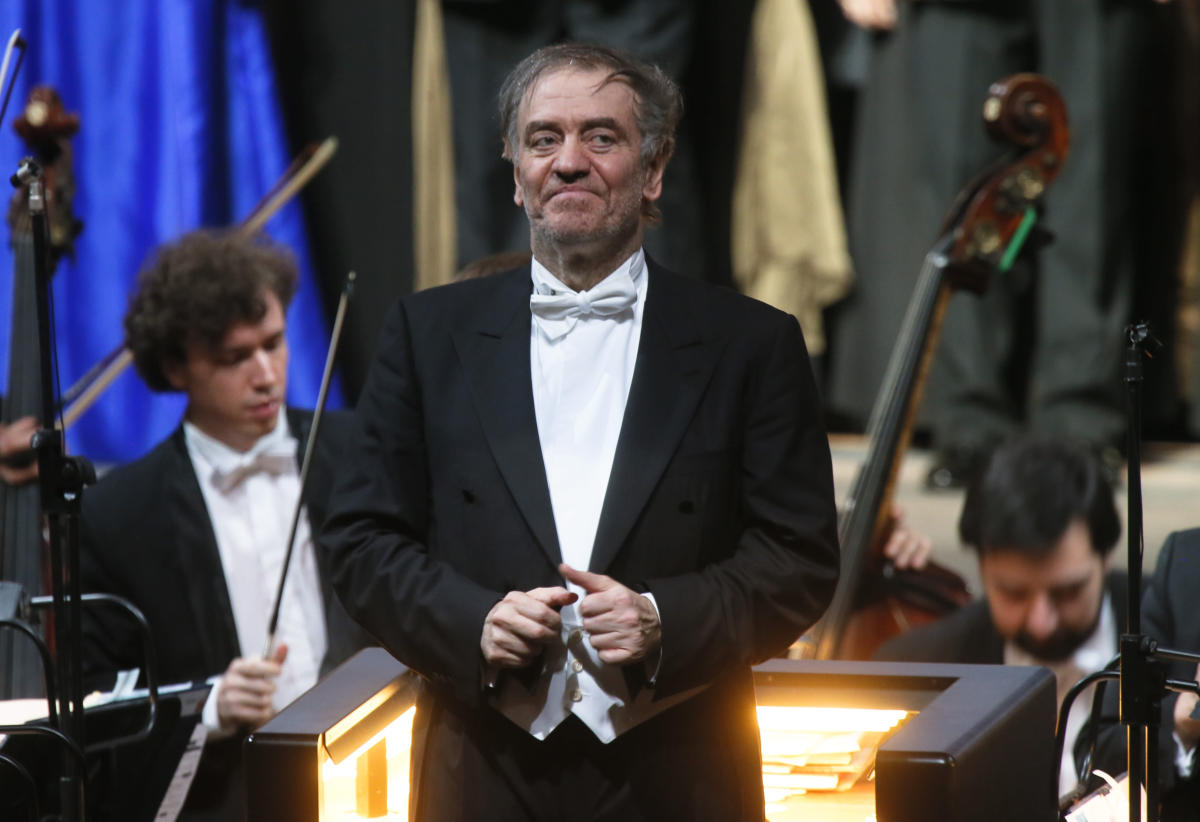
NEW YORK (AP) — Munich Mayor Dieter Reiter has threatened to remove Valery Gergiev as chief conductor of the Munich Philharmonic unless Gergiev publicly says by Monday that he does not support Russia’s invasion of Ukraine.
The 68-year-old Russian conductor is close to Russian President Vladimir Putin and supported Russia’s annexation of Crimea in 2014.
“I have made my position clear to Valery Gergiev and have asked him to clearly and unequivocally distance himself from the brutal invasion that Putin is waging against Ukraine and now in particular against our twin city, Kyiv,” Reiter said in a statement Thursday. “If Valery Gergiev does not take a clear stance by Monday, he can no longer remain chief conductor of our philharmonic.”
Gergiev has been Munich’s chief conductor since the 2015-16 season. He also is music director of the Mariinsky Theatre in St. Petersburg, Russia, and the White Nights Festival there.
The mayor’s announcement came on the same day the Vienna Philharmonic dropped Gergiev as conductor in a five-concert U.S. tour that starts at Carnegie Hall on Friday night.
“This change was made due to recent world events,” Carnegie Hall spokeswoman Synneve Carlino said.
Ron Boling, a spokesman for the orchestra, said the Philharmonic would not comment when asked whether the decision was made by the orchestra, Gergiev or Carnegie.
Milan’s Teatro alla Scala also sent a letter to Gergiev on Thursday asking him to make a clear statement in favor of a peaceful resolution in the Ukraine, or he would not be permitted to return to complete his engagement conducting Tchaikovsky’s “The Queen of Spades.”
Gergiev was lightly contested by the audience during a performance Wednesday night, but the situation changed dramatically with the Russian invasion overnight, theater spokesman Paolo Besana said. He is next scheduled to appear in Milan on March 5.
Milan Mayor Giuseppe Sala, who is La Scala’s president, said the request was made because Gergiev had declared his closeness to Russian President Vladimir Putin on multiple occasions.
“We are asking him to take a clear position against this invasion, and in the case in which he doesn’t do it, we are constrained to renounce the collaboration,” Sala said. ”It is clear that the culture can go on other levels, but in front of such a situation we need to act.”
La Scala said Friday it had not yet received a response.
Online posts in recent days had promised protests at Carnegie Hall, where Gergiev was to lead the Vienna Philharmonic on Friday and Saturday nights, and Sunday afternoon. The orchestra then travels to Hayes Hall in Naples, Florida, for performances on Tuesday and Wednesday.
Metropolitan Opera music director Yannick Nézet-Séguin will replace Gergiev for the Carnegie concerts, creating a busy schedule. Nézet-Séguin leads the Met premiere of the original French version of Verdi’s “Don Carlos” in a five-hour performance on Monday night.
Russian pianist Denis Matsuev will not perform as scheduled on Friday and was replaced South Korem Seong-Jin Cho. In 2014, Matsuev said he supported Russia’s annexation of Crimea.
Vienna said the weekend programs would remain unchanged, and a conductor for the Florida concerts will be announced.
Semyon Bychkov, another top-level Russian conductor, issued a statement critical of the Russian government, The 69-year-old is music director of the Czech Philharmonic and was music director of the Orchestre de Paris from 1989-98. He emigrated to the U.S. in 1975 and has lived in Europe since the 1980s.
“Silence in the face of evil becomes its accomplice and ends up becoming its equal. Russian aggression in Ukraine brings us to what my generation hoped would never happen again: War,” Bychkov said. “One has to be demented to refer to the collapse of the Soviet Union as the greatest tragedy of the 20th century, which is how Putin defined it, rather than rejoice at the fact that it happened without bloodshed and brought an end to the kidnapping of many nations in addition to Russia itself.”
Chicago Symphony Orchestra music director Riccardo Muti took the rare step to address the audience before a performance of Beethoven’s Ninth Symphony at Orchestra Hall on Thursday night.
“What I, we are seeing on television is horrible,” Muti said. “And, tonight in the final movement of the symphony, Beethoven taking the text from Schiller, he speaks about joy, joy, joy. But we will think in that moment that joy without peace cannot exist. And so I hope that from this wonderful hall — from the orchestra, from the chorus, from you — a message should arrive to all the people that not only in Ukraine but in world (who) are creating violence, hate, and a strange need for war: we are against all that.”




